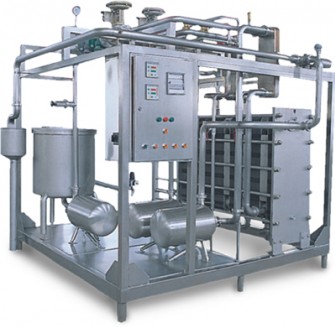
Cream Pasteurizer
In the dairy industry, a cream pasteurizer is a specialized piece of equipment that ensures cream is pasteurized under hygienic conditions, making it safe and ready for consumption. Cream is a valuable ingredient obtained from the fatty part of milk and is used in various products such as desserts, soups, sauces, and many dairy products. The cream pasteurizer ensures that this product is free from microorganisms and extends its shelf life. Here are detailed insights into the features, working principle, and importance of the cream pasteurizer in the dairy industry.
What is a Cream Pasteurizer?
A cream pasteurizer is a device that heats cream to a specific temperature (usually between 72°C and 85°C) for a certain period of time to eliminate harmful microorganisms and ensure the product’s safety. The pasteurization process extends the cream's shelf life while preserving its nutritional value and flavor.
Features of the Cream Pasteurizer
-
Hygienic Design:
-
Made of food-grade stainless steel (AISI 304 or 316).
-
Easy-to-clean and disinfect surfaces.
-
Hygienic connections and seals.
-
-
Temperature Control:
-
The pasteurization temperature is adjusted with a precise temperature control system.
-
Typically operates between 72°C and 85°C.
-
-
Heat Exchanger:
-
Uses a plate or tubular heat exchanger to ensure energy efficiency.
-
The cream is rapidly and uniformly brought to pasteurization temperature.
-
-
Automation System:
-
Modern pasteurizers feature automatic temperature and time control.
-
Minimizes human error and increases process efficiency.
-
-
Capacity:
-
Can be designed in different capacities, ranging from small-scale businesses to industrial facilities, according to need.
-
Working Principle of the Cream Pasteurizer
-
Heating: The cream is heated to the pasteurization temperature (typically between 72°C and 85°C).
-
Holding: The cream is kept at this temperature for a specified period of time (for example, 15-30 seconds).
-
Cooling: After the pasteurization process is complete, the cream is rapidly cooled to stop microbiological activity.
-
Storage: The pasteurized cream is stored under hygienic conditions or sent directly for packaging.
Advantages of the Cream Pasteurizer
-
Food Safety: Harmful microorganisms are eliminated, ensuring product safety.
-
Extended Shelf Life: The pasteurization process extends the cream's shelf life.
-
Preservation of Nutritional Value: Pasteurization helps maintain the cream's nutritional value and flavor.
-
Energy Efficiency: Energy savings are achieved through the heat exchanger.
-
Automation: The process is automatically controlled, minimizing human error.
Applications of the Cream Pasteurizer
-
Cream Production: Used for the production of pasteurized cream.
-
Butter Production: Cream is used as a raw material in butter production.
-
Dairy Industry: Pasteurization of cream used in products like yogurt, cheese, and ice cream.
-
Food Processing Facilities: Processing of cream used in desserts, soups, and sauces.
Why Should You Use a Cream Pasteurizer?
-
Increases the safety and quality of the cream.
-
Extends the product's shelf life.
-
Reduces operational costs through energy efficiency.
-
Standardizes production processes through automation.
In the dairy industry, the cream pasteurizer is an indispensable piece of equipment for producing high-quality and safe cream. The pasteurization process ensures that the cream is free from microorganisms and extends its shelf life, while preserving its nutritional value and flavor. By selecting a cream pasteurizer suitable for your business needs, you can optimize your production processes and gain a competitive advantage.
Cream pasteurizer, pasteurizer, plate pasteurizer, plate cream pasteurizer, dairy industry equipment, pasteurized cream production, cream processing technology, hygienic cream production, dairy product pasteurization, food safety equipment, industrial cream production, dairy processing technology, cream shelf life extension.
